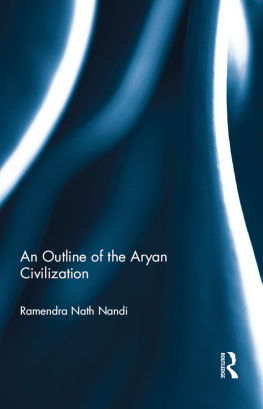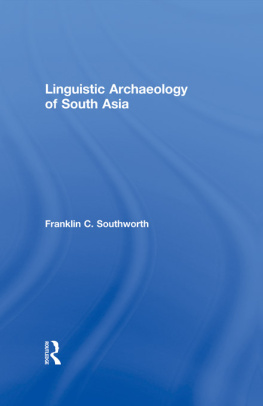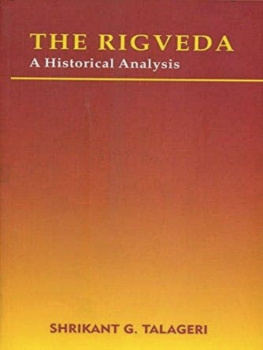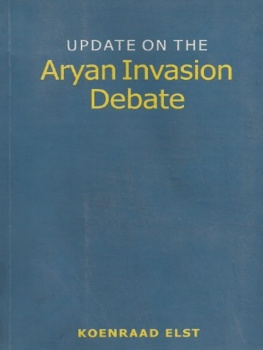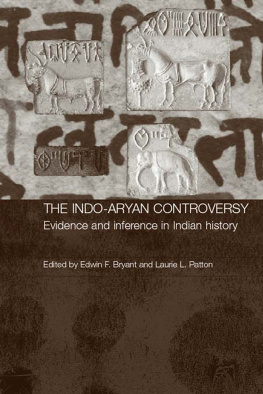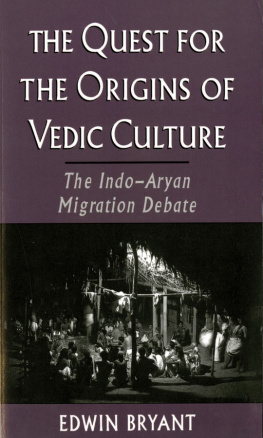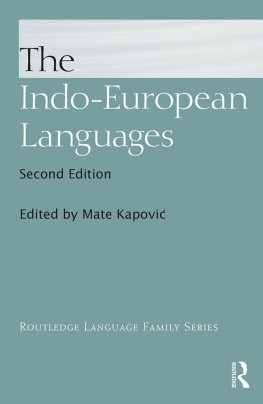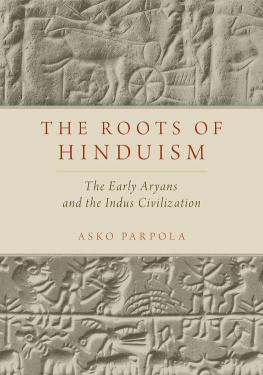THE INDO-ARYAN CONTROVERSY
For the first time in a single volume, this book presents the various arguments in the Indo-Aryan controversy by some of the principal scholars in this field of study. Its essays provide a template for the basic issues involved in the debates by addressing four major areas. First, archaeologists consider some of the recent findings and interpretations of the archaeological record, focusing particularly on the issue of the relationship between the Indus Valley archaeological complex and the culture of the Indo-Aryans as expressed in the Vedic texts. These chapters consider whether there was more continuity between the two civilizations than has been assumed in earlier works, and evaluate whether there is enough evidence to establish a definitive scholarly consensus as to whether or not the Indus civilization was actually Indo-Aryan. Second, scholars take on some of the linguistic issues in the debate, particularly the relationship between Indo-Aryan and its parent language Indo-European, as well as the linguistic borrowings between languages and language families. The discussion here rests on whether the traditional rules of linguistic derivation for Indo-European languages allow for the possibility that the origins of the Indo-Aryan languages developed in India itself. Additionally, authors debate whether contact between Indo-Aryan and non-Indo-Aryan languages (such as Dravidian or Munda) is the result of Indo-Aryan as a language intruding into the subcontinent, or whether other types of mutual interactions between those languages can account for such contacts. Third, philological scholars sieve through the Vedic texts to find clues that might situate the Vedic Aryans in space and time by correlating them with the archaeological record. Different scholars examine references to items associated with the Indo-Aryans such as iron, the horse, and chariot, as well as astronomical data, to consider the implication such references have for the dating of the Veda, a crucial issue in this debate, and the geography of its horizons. Finally, historians contribute historiographical contexts for the debates, stressing the ways in which positions on this issue might be influenced by socio-political or ideological currents, both in the early debates in the nineteenth century as well as today.
Edwin F. Bryant received his doctorate from Columbia University in 1997, where he taught Sanskrit and Hindi. He was the Lecturer in Hinduism at Harvard University for three years, and is presently Associate Professor in Hinduism at Rutgers University, New Jersey. His publications include books on the Indo-Aryan invasion debate and on the Krishna tradition. He is presently working on a translation of the Yoga Sutras and its commentaries.
Laurie L. Patton is Professor of Early Indian Religions at Emory University and Winship Distinguished Research Professor in the Humanities. She is the author of two books and twenty-five articles on early Indian myth and poetry, as well as a book of poetry, Fire's Goal: Poems from a Hindu Year. She is presently completing a translation of the Bhagavad Gita. Her current book project is a collection and analysis of a series of life histories of women Sanskritists in India.
THE INDO-ARYAN
CONTROVERSY
Evidence and inference in
Indian history
Edited by
Edwin F. Bryant and
Laurie L. Patton

First published 2005
by Routledge
2 Park Square, Milton Park, Abingdon, Oxon OX14 4RN
Simultaneously published in the USA and Canada
by Routledge
270 Madison Ave, New York, NY 10016
Routledge is an imprint of the Taylor & Francis Group
This edition published in the Taylor & Francis e-Library, 2005.
To purchase your own copy of this or any of Taylor & Francis or Routledge's collection of thousands of eBooks please go to www.eBookstore.tandf.co.uk.
2005 editorial matter and selection, Edwin F. Bryant and Laurie L. Patton; individual chapters, the contributors
All rights reserved. No part of this book may be reprinted or reproduced or utilised in any form or by any electronic, mechanical, or other means, now known or hereafter invented, including photocopying and recording, or in any information storage or retrieval system, without permission in writing from the publishers.
British Library Cataloguing in Publication Data
A catalogue record for this book is available from the British Library
Library of Congress Cataloging in Publication Data
A catalog record for this book has been requested
ISBN 0203641884 Master e-book ISBN
ISBN 0203678370 (Adobe eReader Format)
ISBN 0700714626 (hbk)
ISBN 0700714634 (pbk)
CONTENTS
PART I
Archaeology
PART II
Archaeology and linguistics
5 Archaeology and language: the case of the Bronze Age Indo-Iranians
PART III
Philology and linguistics
PART IV
Historiography
CONTRIBUTORS
Edwin F. Bryant is Associate Professor of Hinduism at Rutgers University, where he teaches Hindu religion and philosophy. His publications include The Quest for the Origins of Vedic Culture: The Indo-Aryan Migration Debate (2001). He is translator of Krishna: The Beautiful Legend of God, Srimad Bhagavata Purana Book Ten (2004). He is also editor of Sources of the Krishna Tradition (in press) and with Maria Ekstrand, of The Hare Krishna Movement: The Postcharismatic Fate of a Religious Transplant (2004). Bryant is currently at work on a translation of Patanjali's Yoga Sutras and its commentaries.
Christian Carpelan is Researcher at the Department of Archaeology at the University of Helsinki. His special field is archaeology of northern and eastern Europe. He has presented papers on the early contacts between Uralic and Indo-European in a number of international settings. He is the co-editor (with Tony Hackens and Hagne Jungner) of Time and Environment: A PACT Seminar (1992) and Early Contacts Between Uralic and Indo-European: Archaeological and Linguistic Considerations (2001).
Madhav M. Deshpande received his MA (1968) at the University of Pune in India and his PhD (1972) at the University of Pennsylvania. In 1972 he joined the University of Michigan where he is currently Professor of Sanskrit and Linguistics. He has published several books and hundreds of articles on Indo-Aryan and Paninian linguistics, religion, and philosophy.
Koenraad Elst earned MA degrees in Philosophy, Chinese Studies and Indo-Iranian Studies at the Catholic University of Leuven, Belgium. His PhD dissertation on Hindu nationalism, Decolonizing the Hindu Mind, became a best-seller in India. Making his living mostly by journalism, he has been active as an independent scholar in the fields of comparative religion and philosophy and of the history of India. Among twenty published titles, most attention has been drawn by his Update on the Aryan Invasion Debate; Gandhi and Godse (a close discussion of the apology of Mahatma Gandhi's assassin Nathuram Godse); The Saffron Swastika: The Notion of Hindu Fascism; and Ayodhya, the Case against the Temple.
Lars Martin Fosse is an independent scholar with a doctorate in Sanskrit. He has also studied Hindi and Middle Indic languages, as well as Greek and Latin, at the Universities of Oslo, Heidelberg, and Bonn. His research interests involve stylometry (statistical analysis of the language and style of Sanskrit texts) as well as Vedic and epic studies. In addition to authoring several articles in these areas, he has taught at the University of Oslo in Sanskrit, linguistic statistics, and Hinduism.


